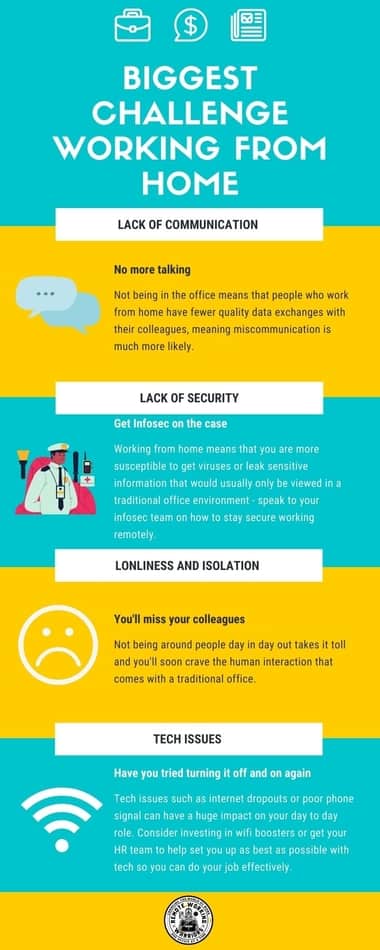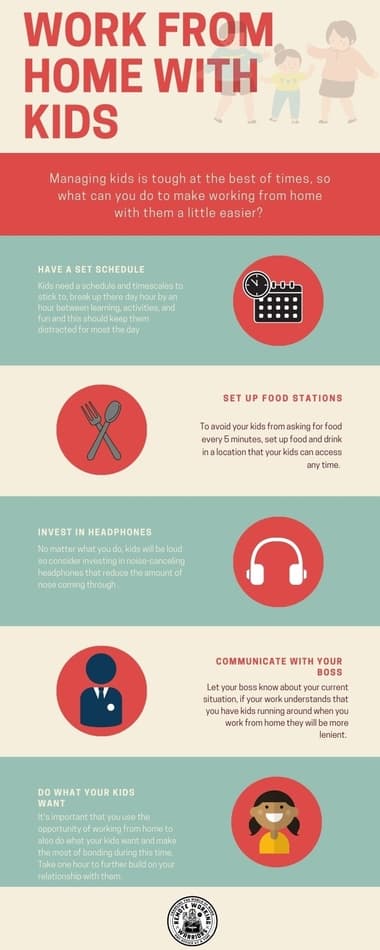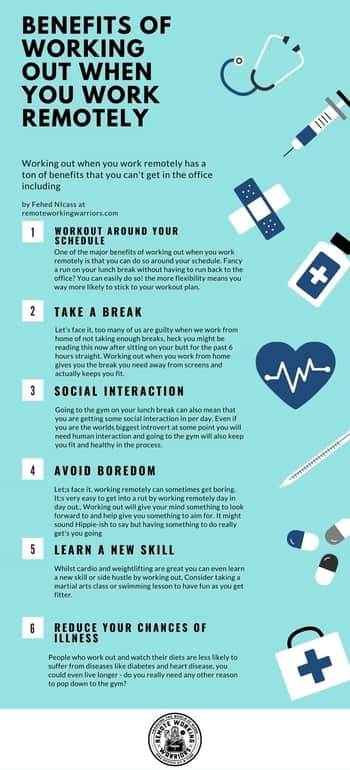This website is supported by its readers. If you click one of my links I may earn a commission. I am also a participant in the Amazon affiliates programme and I will also earn a commission from qualified purchases.

One of the biggest things I used to hear about before I started working from home was how challenging it would be. Initially, I thought people were overreacting and that working from home would be a walk in the park…. Turns out that was a pretty big underestimation on my part.
Loneliness and isolation, poor time management, less of a work-life balance, and miscommunication are the most challenging aspects when it comes to working from home that people face. This can lead to potential setbacks in your health and career in the long term.
So what are some more of the major challenges that people face when working from home? And what can you do to overcome these issues? Keep reading to find out more
(Just a heads up a lot of people reading my blog are in the process of designing their own home office. If you want to save some of the painstaking time I did in designing my office, you can find my recommended products here)
Loneliness and Isolation
Easily one of the biggest challenges when it comes to working from home is the loneliness and isolation you feel.
This is especially apparent if you live by yourself.
Not commuting to an office and working with others means that you don’t have their small social interactions you might forget are essential to building your social skills.
It’s not uncommon to feel more isolated with around 45% of employees who work from home feeling somewhat lonely when compared to working from an office?
So how do you overcome this? Well luckily I’ve written an entire blog post talking all about isolation this which you can check out here but a few quick tips include:
- Going out on your lunch break
- Making plans with your friends/family straight after work
- Consider getting a pet
- Invite your friends or families to work from home with yourself ( so long as this fits into your HR policies)

Time management
Whilst people who work from home are more productive than their office-based counterparts, working 16.8 days more per year, the truth of the matter is that poor time management is a major problem us remote workers face.
A lot of us feel the need to overwork and have the perception that management will take away the privilege of letting us work from home and so we have a habit of wanting to work longer hours.
Poor time management can prove to be challenging as it eats into your personal life and time away from things that, let’s be honest, are more important than work like your kids.
So how do you make sure that you manage your time effectively?
I like to break my workday down into one-hour increments, ensuring I do my busiest task first (a great book that talks about this is Eat That Frog)
I then use the rest of the hours to split my day with other tasks which can also consist of chores and ensure that I fish my workday as I would in the office.
I also make sure that I set one hour specifically for emergencies.
We’ve all had moments working from home when you’re in the middle of doing chores aka, using the restroom and you get an emergency meeting put in so why not play it safe and set an extra hour in.
Creating an office space
Another challenge I faced when I first started working from home was that I had nowhere to work from.
A lot of employers when they allow their employees to work from home underestimate their employees’ home setup.
The sad fact of the matter is that not everyone’s home is set up to work from home with overcrowding, no quiet space, or a hefty investment required to effectively work from home.
The best way to overcome this would be to try and set up your own inexpensive home office.
Trust me when I say having a designated space to work makes all the difference and even if you live in a tiny apartment ( like me) having a corner of your living space you can use to knuckle down to work will massively help you stay focused.
So what are some of the minimum bits of equipment you should invest in when working from home? I recommend the following:
Speak with your HR team about these above items as they may expense some of the cost to help you set yourself up effectively.

Technology problems
Let’s face it, we’ve all been there, a super important meeting or call needs to take place, and then boom technology problems leave you feeling frustrated and unable to do your job.
According to CNET, you’re not alone with around 33% of people who work from home have regular problems with technology and the internet when working from home.
It’s also one of the biggest reasons that employers act as not letting their employees work from home.
So how do we get over technology problems when working from home?
The simple answer, to be prepared.
Whenever I have anything super important to do with work that requires technology I make a list of all the items I will use (wifi router laptop, monitor, my funky LED Lights) and then come up with a backup plan for each of these.
For example, let’s say my wifi cuts out when working from home ( which is a lot more common than you might think) I’ll make sure I invest in a decent wifi booster ( click on the link to find my recommendation ) or ensure that I have enough data on my phone to tether to my laptop if needs be.
If my laptop breaks down I have a cheaper, older, inexpensive laptop set up on the side ready to go.
Spend part of your weekend running through what regular tech you use to do your job, come up with a backup for them and you’ll find that any unwanted tech issues will be a thing of the past.
Security Issues
Another major challenge that those of us who work remotely face regularly is security issues.
One of the benefits of working from a traditional office is that offices are designed for security, your information security team will ensure that you meet the IT and security regulation required in order for you to do your job.
Working from home this might not be the case, with a slower internet connection being more susceptible to things like computer viruses.
Handling personal data may also prove to be challenging especially if you work from a home office with other people not from the same company as you meaning this data is much more likely to escape.
The best way to overcome this then would be to do the following:
- Ensure you have an antivirus installed and keep it updated
- Set up a meeting with an information security team about how to set up your home workspace
- Invest in noise-canceling headphones which keep all the sensitive data that could be spoken about in meetings and calls to you only
- Communicate constantly with management if you feel there may have been a breach of security
Increased distractions
Whilst traditional offices definitely have their distraction ( I usually find the terrible choice in songs on the radio does it for me) working from home has a huge number of distractions to contend with.
I mean let’s face it, your home is set up for you to be comfortable and relaxing and so you’re surrounded by things to keep you away from work.
Some of the most common distraction I find when working from home are:
- The TV
- Netflix/other streaming services
- The internet
- Radio/music
- Bed
- A comfortable sofa
- The garden
- The people you live with
So how can you avoid these distractions?
Firstly, setting up a home office or specific workspace in your home will go a long way to getting rid of external distractions from your living space. If possible, keep it located away from where you spend your time to relax.
Now in terms of distractions caused by the people you live with, try to communicate with them letting them know when you can and can’t talk, I like to use an open door policy which is if the door is open come on in but if the door is closed it’s time to focus.
Now younger children might be a bit tougher to communicate to so if you are interested in finding out how to manage kids when working from home check out this blog post here.
Distractions caused by the internet or streaming platform are tough because they can be accessed from anywhere ( Work phone, laptop) and so I would consider investing in apps like Offtime or Moment which limit the amount of time you can spend on apps that can be distracting like Facebook or Instagram.
Lack of office culture
Ever laugh at a joke one of your friends said that you were too far away to hear?
Trying to manage office culture with remote employees can feel the same and is one of the biggest challenges employers face.
Great office culture can mean the difference between your employees going above and beyond for the companies they work for retaining their staff for longer vs doing the bare minimum and getting nothing done.
Workplace culture is so important because 92% of leaders from top-performing companies see culture as the difference between hitting financial goals and missing them.
So how can you ensure that you have a strong office culture when most of your employees work from home?
Well according to employee engagement specialist Reward Gateway the following are great steps to follow:
- Ensure your values are visible – if you have strong values that are prompted in the office, use them on things like zoom calls, for example, if one of your company values is pushing the boundaries, in your team meeting ask everyone to bring one thing they did in the last week that helps push the boundaries
- Come up with alternative team-building exercises – Whilst the trip down to a pub or restaurant is most organizations way of engaging their employees, consider using alternative ways to engage your staff if they all work remotely, quizzes are a great way to help build up a sense of culture but consider things like an episode of cribs where everyone shows each other around the workstation to help raise morale ( I’ve listed a video on this below)
- Use power to peer recognition – Using platform like Reward Gateways smart hub allows your employees to recognize each other through e-cards linked to your values, keep updated with the latest company news or even offer peer to peer monetary awards – a simple way to digitize your company culture no matter how long you’ve been working at home for.
Inconsistent pay
One major challenge that people who work from home face quite often is inconsistent pay. This can happen if your role is usually done on a pro-rata or per hour basis as opposed to a yearly salary ( think zero-hour contracts)
Due to the nature of working from home a lot of the roles that people can do working remotely, such as copywriting, programming and proofreading are often done on a project by project basis leaving you with large gaps in between paychecks.
This may be set to also affect salaried employees with Deutsche Bank suggesting that employers pay employees less money for the privilege of working from home.
The good news is there are a few things you can do about this:
- Most governments will allow you to claim back money through tax credits saving you some money on your outgoings
- If you are an agency based worker or primarily specializes in digital skills consider signing up to websites like Fiverr or Upwork which can keep you busy for a significant period of time without having gaps in your pay
- Focus on three or four key skills in which you specialize in and start a side hustle focusing on these, this may be a longer game but doing something like starting a Youtube channel around this can massively increase your reach.
Weaker perception of work
So this challenge is one that a lot of HR teams and managers would never admit.
Despite there being legislation in place to ensure employers treat all their employees equally, the truth of the matter is that not being in a traditional office, 9 to 5 means that a lot of your colleagues will perceive you to not be lazy and not working hard.
This could potentially damage your career in the long term, causing you to be looked over for potential job roles.
The challenge can be exacerbated if you are the only employee in your team who works from home, so how do you overcome a perception of being lazy when you work from home?
The best thing is to communicate constantly with management, hold yourself accountable by sharing what it is you hope to accomplish every day, and ensure you set up meetings with your teams and manager at least once per week to get some facetime in with them.
The truth of the matter is that if you outwork the rest of your employees constantly you can let the work show for itself, forcing you to become one of your company’s best employees.
Managing your kids
Managing your kids is difficult enough as it is let alone having to manage them when you work from home.
Noise, interruptions to your workday, and keeping an eye on kids are some of the biggest challenges you have when working from home with kids and so it’s important that you get the right time in with them to avoid all of these.
I’ve actually written a blog post that you can check out talking all about these here however to summarize I would do the following:
- Ensure your kids get enough sleep
- Consider hiring a babysitter
- Look into daycare if you can afford it
- Set up a food and drink station
- Get them involved on your day to day basis
- Communicate effectively with your colleagues if you are struggling.

Managing your pets
Similarly to children’s, pets have a habit of being super distracting when working from home and can prove a challenge or those of us who have had years working from home
Where kids grow old and become self-aware, pets can be incredibly difficult to manage with the lack of self-awareness never going away
To help overcome this challenge I’ve written a post talking all about it here but the best ways to manage your pet from home include
- Have a designated room for your pets away from your workspace
- Take your pets outside to get them some fresh
- Consider pets that are relatively low Maintenance like reptiles
- Tire your pets out by playing with them, the more time your pet stays asleep, the more time you can work
Communicating effectively and miscommunication
Communication is one of those things that we all think we are good out but in reality, is something we all need to be constantly improving upon
Working from home means you’re not around your colleges, reducing the amount of quality data exchanges you have with each other.
This can cause significant challenges to your work causing delays in completing your tasks or upsetting your colleagues through bad communication.
The best way to overcome this when working from home then is to use multiple forms of communication.
Don’t be afraid to pick up the phone and give your colleagues a call, consider sending them emails and slack messages or even jump on a zoom call – variety is the spice of life, and if your the type of person who is a keyboard warrior when you work from home, it might be time to change things up.
Aim to set regular periods wherein you can catch up with people around you both from work and close people in your personal life and communicating effectively with them will become second nature to you.
Staying productive
A recent study by Airtasker found that employees who work from home on a regular basis, on average work 16.8 days more than their office-based counterparts. This averages out to 1.4 days per month.
In essence, employees who work from home are more productive than other employees.
That being said staying focused and productive can still prove challenging for a lot of us working from home.
A lot of the time it’s a mind game, you see whilst we are more productive working from home, we tend to remember things with rose-tinted glasses and a lot of us feel as though we are more productive in a traditional office.
If you are struggling with staying productive when working from home there are a few key tips that I would follow:
- Take regular breaks
- Do your most difficult task first
- Get time away from your screen
- Keep one hour free every day in case of work or personal emergencies
- Finish your workday as you would in the office.
Not having a set schedule
Whilst not having a set schedule when you work from home is fun at the beginning of your remote working journey (I mean who doesn’t like waking up a minute before your first meeting) not having a clear schedule can have a detrimental impact on your ability to complete your set out tasks.
With the increased distractions and getting pulled with your work and personal life, it’s super important to ensure that you have a set schedule.
I like to do this by planning out my week by doing the following:
- A week before I lay out a rough plan highlighting the big tasks I need to accomplish the next week, as well as the tasks that are set in stone every week such as meetings or making a set number of calls.
- A day before my next day I schedule out tasks that are essential to get done in that day, this is great for any last-minute projects that come up
- I always keep one hour spare, usually between 4 and 5 every day. This is great in case tasks overrun. It being at the end of the day also means you can make a start on the next day’s work
- I set myself a hard deadline at 5, working well into the evening defeats the purpose of working from home.
Overworking
When working from home, a lot of us just don’t have a set schedule and tend to feel massive amounts of burnout due to overworking.
Overworking is a real challenge when working from home and can have some severe impacts including stress, poorer performance at work, and low morale.
The best thing to do then if you are feeling overworked when working from home is to communicate with your boss. Doing so will communicate how much work you can take on at once.
I would also recommend sticking to a strict schedule that benefits you. If you check your email in the middle of the night or first thing in the morning, get into the habit of avoiding this and take more time to be present.
Working a set deadline per day will force you to get the tasks done in the time that you’re given, at the end of the day, your work will always be there for you to complete.
Not getting enough exercise
Ever finish a day at the office, intending to go to the gym afterward, have to make a detour home, and then end up scrapping your gym plans altogether?
Throw working from home into the mix and you know it can be super difficult trying to get into exercise when you’re already nice and warm.
It’s recommended that people get 150 minutes of exercise per week and so if working from home is stopping you from doing this, it’s time to change this up.
A great option is molding your workday around your exercise plan, aim to get up an hour earlier, and go to the gym in the morning which can help you get a catch on the day.
Alternatively, consider going to the gym or exercising when on a break from work during the day.
This will keep you focused to continue on with your workday but also allows you to squeeze in a workout when you might be more motivated to do it.

Eating more junk food and having a poorer diet
The pantry is all too easy to wander off to in the middle of your workday and if you don’t watch what you eat when working from home, your waistline will soon pay the price.
Maintaining a healthy diet plan can be one of the most challenging aspects of working from home but there are a few easy fixes.
Firstly, people tend to eat the food they have in their house, try to avoid keeping junk food in your home and you’ll find yourself eating a lot less of it.
A lot of people tend to graze and eat foods when they feel hungry so aim to eat 3 healthy meals per day, this should keep you fuller for longer and avoid you wanting to snack in between meals
Finally, to save you time or ordering take out, consider meal prepping your food in advance.
People spend about 61 minutes per day preparing their food so why not save time and lose weight at the same time by preparing your food in advance.
Poor hygiene
Human beings love the path of least resistance and working from home has massively shown this.
Let’s face it, how many times have you worked from home in your bedclothes? Better yet, have you noticed that you’re taking a lot less showers than you used to?
You don’t need me to tell you that poor hygiene can cause serious health problems like poor body odor, and greasy skin.
You’re not alone with a study from The Daily Mail showing that 25% of people don’t shower every day now that they are working from home.
So what can you do to avoid poor hygiene when working from home.
Simply put, make it a part of your routine.
Get up in the morning and shower and get hanged, these two small things will make the world of difference in staying clean
Not having time for your loved ones
This challenge is one of the ones that most of us hate to admit to.
You’d think working from home means that you would have more time to hang out with your family and build upon existing bonds with your loved ones.
The truth of the matter is that working from home often means overworking, working late into the night, or not taking advantage of your time away from your desk.
If your friends and family don’t live in the same home as you then you know how hard it can be getting some time in with them.
The best way to overcome this then is to ensure you make plans in advance. Whilst you might not be able to be spontaneous in hanging out with them, scheduling in time a few days or weeks in advance will make sure that you are doing your bit to still try and connect with them.
Not getting out enough
Not getting out enough is another major problem we remote workers have.
As soon as it hits 5 it’s a lot less likely that you’ll see me moving from the couch,
Not getting out and getting enough fresh air can lead you to feel irritable, deflated, and lower your mood overall.
This can be exacerbated if you don’t have a garden or balcony to relax on.
The solution? Make going out a part of your day, even if it’s a 30-minute walk to just get some fresh air it will work wonders on your wellbeing and ensure that you come back to work feeling fresh and ready to take on the world.
Too much screen time
So according to my iPhone, my screen time has been up about 20% since I’ve started working from home.
With no colleagues to distract you, it’s not uncommon to work for hours on end in front of a laptop when working from home.
This can cause some serious health issues for your eyes.
The solution? Take 15 minutes away from your screen and look away, consider investing in eye protection (you can find my recommendation on eye gear here), and try to limit screen time before you go to sleep, giving your eyes a chance to recover.
Car not getting used
A lot of us are used to commuting into the office. Working from home thankfully saves us around an hour commute per day or about 16 miles worth of driving per person.
Whilst time savings are fantastic, this does lead to us not using our cars.
This can add up to a lot of unwanted costs around this like car tax, car insurance, and other costs for your vehicle even though you don’t use it.
Consider how frequently you currently use your car, ask yourself if you still need it? If you can downgrade to something more expensive.
Potential lack of career
Let’s call a spade a spade, working from home can potentially harm your career.
A lot of HR teams would never admit to this but if they see a history of working from home on your resume, they might feel as though you are difficult to work with or not a team player and so may overlook you for certain roles.
The best way to overcome this is to be open and honest.
Give the reason why it is you worked from home previously. Consider things like LinkedIn recommendations from your colleagues that talk about how well you managed or communicated with them when working from home and this should help overcome any objections.
Brain fog and lack of social skills
This was very surprising to me when working from home.
Speaking with people on a daily basis and having constant social interaction with your colleagues actually improves your social skills and makes you feel sharper.
Working from home means you have a lot less social interaction and I’ve definitely found that my memory and overall social skills have declined slightly since working from home.
For myself at least, in social situations now it takes me about 5 minutes to acclimatize when going out and I’m good but for others, this could be a lot longer.
The best way to overcome this challenge then is to ensure you are getting some social time every day.
Consider starting a hobby that you can enjoy and speak to people with.
I’d also recommend using classic video games like brain training or doing word searches frequently as a way of ensuring your brain performs at it’s best.
Fear of missing out
Finally, there is the fear of missing out or FOMO.
If you’re the only one working from home and the rest of your colleagues are in, you may miss some of the benefits that come with a normal office such as cake on your colleague’s birthday or the random jokes that come about working from an office space.
If all your colleagues are working from home too you may just feel as though you are missing out on the experience of work if the rest of your friends and family are working from an office and your schedules are out of whack.
The best thing then, to overcome this is to practice mindfulness. The grass always seems greener in situations like this and so it’s important you put things into perspective and look at some of the benefits you have working from home.
You may just find that a lot of people are envious of your situation.
Also a lot of people are curious how I make money when working from home whilst working full time. To find out what I recommend check out my passive income course recommendations here.
The content on this on this site has been written by Fehed Nicass who has over a decades worth of experience in sales and has worked remotely for the past 2 years.
